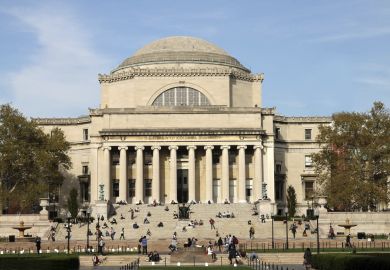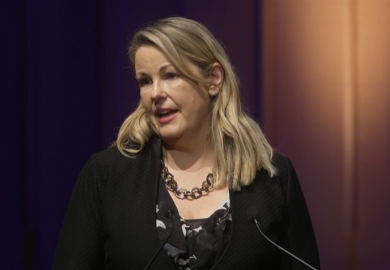The University of Pennsylvania has defended a $20 million (£16 million) deferred compensation payment to its former president, Amy Gutmann, saying it reflected “exceptional” performance over a record term of service.
The pay disclosure was contained in a government filing nearly two years after Joe Biden first nominated Professor Gutmann to serve as US ambassador to Germany, reviving compensation-based criticisms that had long circulated at Penn, an Ivy League campus that has a $20 billion endowment yet leaves its students with an average debt of nearly $17,000.
The Gutmann disclosure also is fuelling the debate heard more broadly in US higher education over what kinds of practices from the corporate world are beneficially adopted by colleges and universities, and which are not.
Professor Gutmann was already one of the highest-paid presidents in US higher education, known to be receiving more than $3 million annually during her final years at Penn, after starting at Penn with base pay and bonuses of about $630,000. The $20 million deferred compensation payment means she averaged about $3.1 million over her entire 17-and-a-half years leading Penn.
“This is more than generous,” one expert in higher education executive compensation, James Finkelstein, professor emeritus of public policy at George Mason University, said of the $20 million deferred compensation payment. “Nothing comes close in the history of Penn, and nothing comes close in the history of higher education.”
The previous known high, he said, was the payout of about $8 million to John Sexton at New York University.
Scott Bok, an alumnus and chief executive officer of a New York investment banking firm who serves as chair of Penn’s board of trustees, said that Professor Gutmann earned that kind of pay.
“It reflects long and distinguished service, exceptional all-around performance, and investment gains on deferred compensation over nearly two decades,” Mr Bok said.
Penn listed Professor Gutmann’s accomplishments as leading two fundraising campaigns that netted more than $10 billion, and awarding some $2.4 billion in undergraduate student aid.
Professor Gutmann – the longest-serving president in Penn’s 282-year history – undoubtedly provided her university with value, Professor Finkelstein said. “But remember this payout has to come from somewhere,” including student tuition, he said.
Deferred compensation “is a concept from the corporate world”, where companies hold back salary as a way to deter their leaders from moving to a competitor, Professor Finkelstein said. “In higher education, it’s not competitive in the same way – there really aren’t a lot of trade secrets in higher education that you’re afraid of losing,” he said. And presidents rarely move to other institutions anyhow, he said.
The more likely reason for such a large withholding, Professor Finkelstein said, was to reduce public controversy by preventing people from knowing true presidential salary rates in real time. And many universities now appear to be moving away from that tactic, he said, having found that the bookkeeping costs and other complications of tracking such compensation are not worth the effort.
There is also accumulating evidence – in the corporate world and in higher education – that high pay rates do not correspond to high performance on numerous measures, Professor Finkelstein said. “It’s not borne out by the data, and hasn’t been for years,” he said.
Register to continue
Why register?
- Registration is free and only takes a moment
- Once registered, you can read 3 articles a month
- Sign up for our newsletter
Subscribe
Or subscribe for unlimited access to:
- Unlimited access to news, views, insights & reviews
- Digital editions
- Digital access to THE’s university and college rankings analysis
Already registered or a current subscriber?








